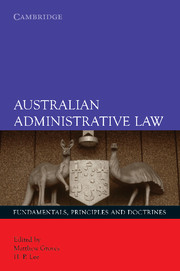Book contents
- Frontmatter
- Contents
- Foreword
- Preface
- About the contributors
- Table of cases
- Table of statutes
- 1 Australian administrative law: The constitutional and legal matrix
- 2 Administrative law in Australia: Themes and values
- 3 The public/private distinction in Australian administrative law
- 4 Australian administrative law: The human rights dimension
- 5 Administrative tribunals
- 6 Australian Ombudsman: A continual work in progress
- 7 Freedom of information
- 8 Delegated legislation
- 9 The concept of ‘justiciability’ in administrative law
- 10 Standing
- 11 Reasons for administrative decisions: Legal framework and reform
- 12 Relevant and irrelevant considerations
- 13 Improper purpose
- 14 Reasonableness, rationality and proportionality
- 15 The ‘no evidence’ rule
- 16 Failure to exercise discretion or perform duties
- 17 Procedural fairness: The hearing rule
- 18 The doctrine of substantive unfairness and the review of substantive legitimate expectations
- 19 The impact and significance of Teoh and Lam
- 20 The rule against bias
- 21 Jurisdictional error without the tears
- 22 Privative clauses and the limits of the law
- 23 Administrative law judicial remedies
- Endnotes
- Index
2 - Administrative law in Australia: Themes and values
Published online by Cambridge University Press: 05 June 2012
- Frontmatter
- Contents
- Foreword
- Preface
- About the contributors
- Table of cases
- Table of statutes
- 1 Australian administrative law: The constitutional and legal matrix
- 2 Administrative law in Australia: Themes and values
- 3 The public/private distinction in Australian administrative law
- 4 Australian administrative law: The human rights dimension
- 5 Administrative tribunals
- 6 Australian Ombudsman: A continual work in progress
- 7 Freedom of information
- 8 Delegated legislation
- 9 The concept of ‘justiciability’ in administrative law
- 10 Standing
- 11 Reasons for administrative decisions: Legal framework and reform
- 12 Relevant and irrelevant considerations
- 13 Improper purpose
- 14 Reasonableness, rationality and proportionality
- 15 The ‘no evidence’ rule
- 16 Failure to exercise discretion or perform duties
- 17 Procedural fairness: The hearing rule
- 18 The doctrine of substantive unfairness and the review of substantive legitimate expectations
- 19 The impact and significance of Teoh and Lam
- 20 The rule against bias
- 21 Jurisdictional error without the tears
- 22 Privative clauses and the limits of the law
- 23 Administrative law judicial remedies
- Endnotes
- Index
Summary
Underlying simplicities
Nature demonstrates that apparent complexity can be generated by uncomplicated rules. Fractal forms based on simple iterations are to be found in plants, animals, clouds, snowflakes, population patterns and galaxies. The Mandelbrot set, one of the most complex mathematical forms known, is based on a simple mathematical relationship. Like organic and inorganic forms in nature, the apparent complexities of different areas of the law, whether they be statutory or judge-made, are frequently generated by a few underlying principles.
These are propositions not always acknowledged within the legal profession of the common law world. In Australia, as in England and other like jurisdictions, there is a well-developed enthusiasm for specialisation. Specialist lawyers and their professional symbiotes in numerous fields assert the market's need for their existence and for specialist judges and courts or divisions of courts. But whatever evolutionary forces drive this speciation, it is difficult to think of any ecological niche in which such practitioners can find shelter from the pervasive influence of public law and that branch of it known as administrative law. There seem to be few, if any, aspects of economic activity in contemporary society that are not supervised by some kind of statutory regulator with powers to grant, withhold, suspend or cancel licences to engage in such activity and to approve or withhold approval for particular transactions.
- Type
- Chapter
- Information
- Australian Administrative LawFundamentals, Principles and Doctrines, pp. 15 - 33Publisher: Cambridge University PressPrint publication year: 2007
- 2
- Cited by



